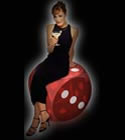31. What if you are caught in a jam ?
Ans : You should throw away your best poker hand.
32. Suppose you are going low on the flop. How should you usually play your hand ?
Ans : Cautiously, unless you can’t get counterfeited, you have an ace-high flush draw, or you have other pot entail.
33. What if you flop top set ?
Ans : You don’t mind going to war if there is no low draw and you are against a maniac type player who easily could have a smaller set.
34. What if you make your low but are sure that you are getting quartered ?
Ans : You may have to throw away your poker hands.
35. Example ?
Ans : You have an ace-deuce. The flop comes 5 ![]() 6
6 ![]() 7
7 ![]() , you are last to act, and five opponents ahead of you are betting, raising, and reraising. In this situation, you probably should discard your hand.
, you are last to act, and five opponents ahead of you are betting, raising, and reraising. In this situation, you probably should discard your hand.
36. When you play an ace-trey in a multiway pot and flop a low draw, what should you often do ?
Ans : Throw away your hand, especially if you have nothing else to go with your low draw.
37. Give an example of a bluffing opportunity ?
Ans : The flop comes 10 ![]() 9
9 ![]() 3
3 ![]() , and there is a bet. You sometimes can raise with virtually nothing. In a short-handed pot, your opponent might have bet an ace-ten figuring that you have nothing.
, and there is a bet. You sometimes can raise with virtually nothing. In a short-handed pot, your opponent might have bet an ace-ten figuring that you have nothing.
38. Suppose you have an ace-deuce, have made your low on fourth street, but have nothing else to go with it. How should you play your hand if there is a bet and a couple of callers ?
Ans : Just call. You don’t want the original bettor to reraise and knock out the players in middle.
39. Suppose the initial bettor is a tight player who almost always goes for low, and you have a medium pair to go along with your low ?
Ans : Now if he reraises and knocks out everyone else, you might win the high.
40. Do you raise on the end when you have the nuts ?
Ans : Not necessarily. It is sometimes correct to check it down.
41. Example ?
Ans : You are last to act in a four-person pot, and the board is 2 ![]() 3
3 ![]() 4
4 ![]() 5
5 ![]() J
J ![]() . If all you have is a wheel, you are probably against one or perhaps two other wheels, as well as a straight flush.
. If all you have is a wheel, you are probably against one or perhaps two other wheels, as well as a straight flush.
42. You have an ace-deuce. How does play in a four-handed pot differ from play in a three-handed pot ?
Ans : If someone else also has an ace-deuce, you lose money by raising in a three-handed pot. Thus you should not raise. In a four-handed pot, you would break even. So now you can raise.
43. What are the exceptions to not raising in a three-handed pot ?
Ans : You play well and are fairly sure that you are not against another ace-deuce, or you are against an opponents who is extremely live.
Introduction / General Concepts / More Specific Ideas / General Concepts / Position / Low Hands / High Hands / Your Starting Hand / Starting With Big Pairs / When You Are First In / How To Play Your Hand / Play on the Flop / When You Have the Best Hand / High Versus Low in Three-Handed Pots / Loose Games / Multiway Versus Short-handed Play / Scare Cards / Getting Counterfeited / Getting Quartered / Playing Against Steamers / Playing Against Tight, Solid Players / Your Playing Style / Reading Hands / Psychology / Afterthought


